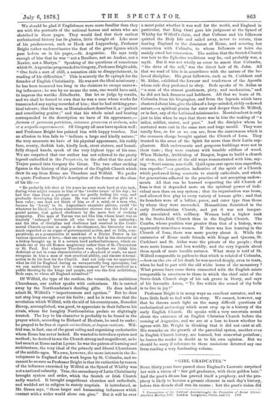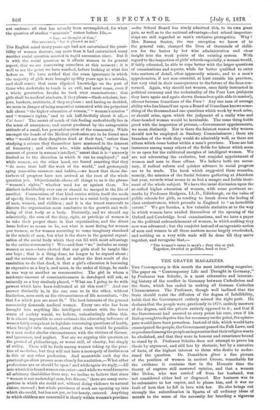"GIRL GRADUATES."* SOME thirty years have passed since England's Laureate
surprised her with a vision of "fair girl graduates, with their golden hair." And the poet's dream has proved itself a prophecy, and the pro- phecy is likely to become a prosaic element in each day's history, before this decade shall run its course ; but the poet's vision did
• Transactions of the National Associatiork.for Me Promotion of Social Science: Abe rdeen Meeting, 1877. London Longmans, Green, and Co. 1878.
not embrace all that has actually been accomplished, for when the question of studies " anatomic " comes before Ida,—
" Nay, we thought of that,"
She answered, "but it pleased us not."
The English mind thirty years ago had not entertained the possi- bility of women doctors, any more than it had entertained many another social question mooted in rapid succession since. But it is with the social question as it affects women in its general aspect, that we are concerning ourselves at this moment ; it is well to see the point we have reached, before looking at what lies before us. We have settled that the crass ignorance in which the majority of girls were brought up fifty years ago is a mistake, and shall cease ; that mere slipshod knowledge on the part of those who undertake to teach is an evil, and must cease, even if a whole generation breaks its back over examinations ; that girls shall be medical students, if they please—Slade scholars, law- yers, bankers, architects, if they so please ; and having so decided, we seem in danger of being somewhat nauseated with the perpetual talk about" the higher education of women," "woman's mission" and "woman's rights," and to ask half-fretfully about it all,— Cui bon° ? The secret of much of this feeling undoubtedly lies in the sense of annoyance, and unrest produced by the antagonistic attitude of a small, but powerful section of the community. While amongst the heads of the Medical profession are to be found men who "would see their daughters dead at their feet," rather than studying a science they themselves have mastered in the interest of humanity ; and others who, while acknowledging "a vast amount of power in woman's intellect," assert that it is "narrowly limited as to the direction in which it can be employed ;" and while women, on the other hand, are found asserting that they "do more than half the work of the world," and grotesquely aping masculine manners and habits,—we know that these dis- turbers of progress have not arrived at the root of the whole question yet. Objectionable above all things to us is the phrase "woman's rights," whether used for or against them. No distinct individuality ever can or should be merged in the life of another. Communism of that kind carries within itself the seeds of speedy decay, but we live and move in a social body composed of men, women, and children ; and it is the truest statecraft to discern the organisation most conducive to the growth and well- being of that body as a body. Distinctly, and we should say admittedly, the sum of the duty, right, or privilege of women is to take their proper share in that organisation, and the direct issue before us seems to be, not what is most fitting for women qua women, or for women according to some imaginary standard in'the minds of men, but what is the share in the general organi- sation of the social body which they can fill with most advantage to the entire community? We—and that "we" includes as many women as men—have elected that our girls shall be taught like our boys ; that is a thing done, no longer to be argued about ; and the outcome of that deed, or rather the first result of the resolution to do that deed, is that a girl's education is becoming as expensive as a boy's, and must, in the order of things, be made in one way or another as remunerative. The girl in whom a
moderate amount of conscientiousness is developed will ask, as naturally as a boy similarly placed, "What am I going to do with powers which have been cultivated at all this cost?" And our answer distinctly is, in the one case as in the other, without limitation, save such as the circumstances of life necessitate, "Do that for which you are most fit." The best interests of the general
community demands medical women. Every one who has been brought into anything like intelligent contact with the lower strata of society would, we believe, unhesitatingly affirm this. it is almost impossible to over-estimate the educating influence of women fairly competent to legislate concerning questions of health, when brought into contact, closer often than would be possible to a man under similar circumstances, with the victims of disease, and ignorance, and neglect. Nor are we arguing this question on the ground of philanthropy, or worse still, of charity, but simply of utility. There will be fools among women taking up the prac- tice of medicine, but they will not have a monopoly of foolishness in this or any other profession. And meanwhile each day the practical question presses more closely for a solution,—What other professions are or should be open? and while again we reply,—All into which it is found women can enter—and while we would remove all arbitrary disabilities from any, we incline to believe that since "woman is not undevelopt man, but diverse," there are many occu- pations in which she could not, without doing violence to natural claims, succeed ; but whole provinces of work are opening up into which she could, but has not yet, or but barely, entered. Anything in which children are concerned is clearly within woman's province —the School Board has wisely admitted this, to its own great gain, as well as to the national advantage—but school inspector- ships are still regarded as man's exclusive prerogative. Why ? Mrs. Nassau Senior, the one exception we know of to- the general rule, changed the lives of thousands of child- ren for the better by her wise administration and clear insight into the weak points of the existing system. With regard to the inspection of girls' schools especially, a woman would, if fairly educated, be able to cope better with the larger question& of examinations and reports, while far better qualified to enter into matters of detail, often apparently minute, and to a man's apprehension, if not non-essential, at least outside his province, but very vital in their consequences to the future of the lives con- cerned. Again, why should not women, once fairly instructed in political economy and the technicality of the Poor Law (subjects they have again and again shown themselves quite able to master), oftener become Guardians of the Poor ? Any one man of average ability who has himself sat upon a Board of Guardians knows some- thing of the thousand and one questions which week by week arise, or should arise, upon which the judgment of a really wise and clear-headed woman would be invaluable. The same thing holds good with the inspection of prisons,—Government appointments, we mean distinctly. Nor is there the faintest reason why women should not be employed as Sanitary Commissioners ; there are branches of the work they would do admirably well, as there are others which come better within a man's province. These axe but instances among many others of the fields for labour which seem to us open for the cultivated energies of intelligent women. We are not advocating the exclusive, but conjoint appointment of women and men to these offices. We believe both are neces- sary, if radical reform and quicker advance in social progress are to be made. The book which suggested these remarks, namely, the minutes of the Social Science gathering at Aberdeen last year, record&what seems to us but a meagre and feeble treat- ment of the whole subject. We have the usual discussion upon the so-called higher education of women, with some pertinent re- marks by Professor Hodgson, LL.D., Edinburgh, on the value of public schools for girls, as tending to break down the feeling of class exclusiveness, which prevails in England to "an incredible extent." We get besides, a few valuable statistics as to the way in which women have availed themselves of the opening of the Oxford and Cambridge local examinations, and we have a paper on the political enfranchisement of women, in which nothing very new was advanced ; but the conjoint instead of antagonistic action of men and women in all these matters seems largely overlooked, and nothing on a very wide scale will be done till they move together, and recognise that,— " The woman's cause is man's ; they rise or sink
Together, dwarfed or godlike, bond or free."



































 Previous page
Previous page